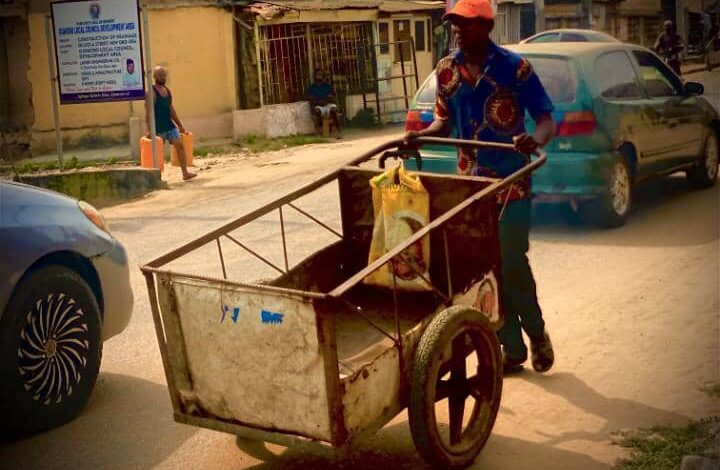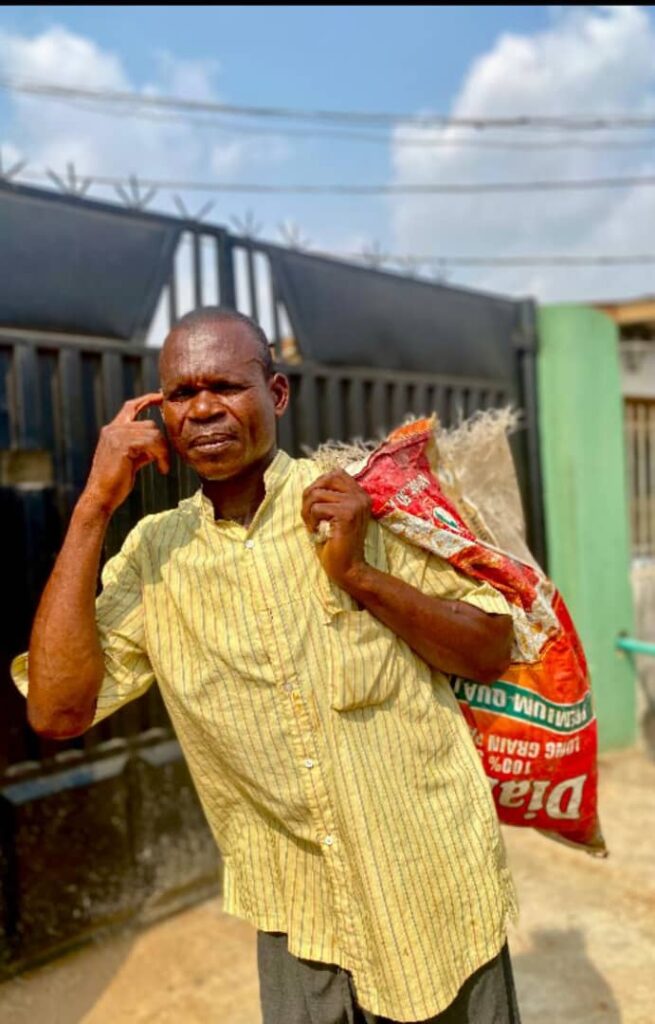From waste to wealth: Unseen hands behind Lagos waste management

By Samuel Ogunsona
In the heart of Lagos, Nigeria’s bustling metropolis, a group of waste warriors is fighting a silent battle against the tide of plastic and paper waste.
Muhammad Hamisu, a 40-year-old scrap scavenger from hails from Katsina State

Photo of Muhammed Hamisu
He has dedicated over eight years to collecting and recycling waste materials.
Muhammad Hamisu’s journey to Lagos began over a decade ago, when he left his hometown in search of better economic opportunities.
“I came to Lagos about ten years ago,” Muhammad Hamisu recounted beaming smiles, a huge bag containing used plastics hung on his shoulders.
“I started working as a laborer, but the work was irregular and poorly paid,” he said brushing away a buzz of houseflies that swirled around his face.
“That’s when I discovered the scrap scavenging business, and it’s been my livelihood ever since.”
Waste has become a major environmental concern globally, with an estimated eight million tons of plastic waste entering the world’s oceans every year.
In Lagos, the problem is particularly acute, with plastic waste clogging waterways and harming aquatic life.
In underlining the risk, experts say research has shown that plastic debris in the ocean can take hundreds of years to decompose, harming marine life and contaminating the food chain.
Muhammad Hamisu and his fellow scavengers play a crucial role in reducing the amount of waste that ends up in landfills and oceans.
They comb the streets and dirty alleys across Lagos often on foot.
They collect plastic bottles, paper, cartons, and scrap metals, which are then sold to recycling companies.
“This is the source of my livelihood” Sanusi Bade who hails from the North East city of Nguru said.
An official from the Lagos State Ministry of Health who does not wish to be names said Lagos generates the largest volume of waste in Nigeria, Africa’s most populous city.
Already, Lagos is believe would be the third largest city in the next few decades giving its sprawling population whereas it is believed Nigeria which population currently stands at 200m would be the third largest country in few years after China and India raising the challenge if waste management in the country.
According to the United Nations, recycling can help reduce greenhouse gas emissions and conserve natural resources.
“We collect plastic bottles, paper, and cartons from households and businesses,” Muhammad Hamisu explained.
He said he sells them to recycling companies, which helps to reduce the amount of waste that ends up in landfills and oceans.
Muhammad Hamisu buys scraps from individuals and resells them to recycling companies. He uses a scale to measure the weight of the scraps in kilograms, but often negotiates prices based on visual inspection.
“We resell the papers/cartons after purchase at the rate of N150 per Kg to those taking them to companies,” Muhammad Hamisu said.
Muhammad Hamisu’s family is aware of his profession and supports him despite the challenges.
“They are happy I am able to earn something, but at the same time, they pray to almighty God that I get something better to do,” Muhammad Hamisu said.
Despite the importance of their work, scavengers like Muhammad Hamisu face numerous challenges.
They are often viewed with suspicion by people and are at risk of being harassed.
“People in the locality/community always look down on us, they don’t value our profession or those into it,” Muhammad Hamisu said.
.
“Society frowns at what we do and looks at us with disdain, we are viewed as criminals due to the activities of a few bad eggs in our midst.”
Muhammad Hamisu’s day begins early in the morning, trekking through the streets, shaking his bell to attract potential sellers.
“Sometimes I get lucky, sometimes I don’t,” Muhammad Hamisu said. “It’s a difficult job, but I just like everyone else into it, start early.”
Muhammad Hamisu benefits financially from his work, but the profit margins are often thin.
“Sometimes we make a profit, sometimes we think we’ve got something good only to be on the short end of stick after the transaction,” Muhammad Hamisu said.
Muhammad Hamisu believes that the government should recognize the role of scavengers in waste management and provide support.
“It would be wonderful for the government to officially recognize us and maybe provide us with Identity cards or uniforms,” Muhammad Hamisu said. “This would help people know we’re legitimately trying to conduct business with them and not criminals.”
Muhammad Hamisu hopes to expand his business and employ others to help him collect and recycle waste materials.
“I hope to stop doing the everyday rounds I am currently doing and have people working for me,” Muhammad Hamisu said.
“Even establishing a small-scale recycling plant might not be out of the question with a bit of support from the Government.”
Muhammad Hamisu advises those considering a career in scavenging to be prepared for the challenges.
“It’s a difficult and stressful endeavor without the society’s acknowledgement,” Muhammad Hamisu said.
“Prepare to be scorned at and to make losses not just profit because it’s all associated with the job.”
As the world grapples with the waste pollution crisis, the story of Muhammad Hamisu and his fellow scavengers serves as a reminder of the importance of waste management and recycling..
